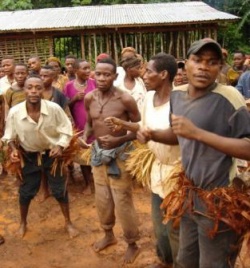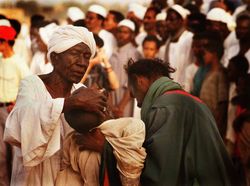Example 2
This example for the use of DPL is based on a copy of articles from the English wikipedia.
If you see articles arranged this way you quickly get an idea of the contents and you may also feel tempted to align structural differences between the articles ...
| Country | Area | Population | #hits |
|---|---|---|---|
| Cameroon
align=right|475,442 |
16,323,000 | %COUNT% | |
| Nigeria
align=right|923,768 |
133,530,0001 | %COUNT% | |
| Somalia
align=right|637,657 |
8,228,000 | %COUNT% | |
| Sudan
align=right|2,505,813 |
36,992,490 | %COUNT% |
Note that the country names in the small table link to the corresponding entry in the big table.
| Country | History | Culture | Area & Population | ||||||||||||||
|---|---|---|---|---|---|---|---|---|---|---|---|---|---|---|---|---|---|
Cameroon |
 Baka dancers in the East Province
Each of Cameroon's ethnic groups has its own unique cultural forms. Typical celebrations include births, deaths, planting, harvesting, and religious events. Larger festivals include the Ngondo of the coastal Sawa peoples, the Ngouon of the Bamum, and the Nyem-Nyem in Ngaoundéré.<ref name="West 17">West 17.</ref> Cameroon is home to over 200 styles of dance, usually performed as part of a ceremony or to accompany a traditional storyteller. For example, the Bamileke perform war dances, and the Tupuri perform the gourna, which involves dancing in a circle with long sticks.<ref name="West 18">West 18.</ref> Several national holidays are observed throughout the year, and movable holidays include the Christian holy days of Good Friday, Easter Sunday, and Easter Monday, and the Muslim holidays of 'Id al-Fitr and 'Id al-Adha.<ref>West 87.</ref> Native styles of music vary from Baka polyphony accompanied by drums and rattles to the drum- and xylophone-based styles of the Bakweri, Bamileke, Bamum, and Beti-Pahuin.<ref>West 18–9.</ref> Popular music styles include tsamassi of the Bamileke, mangambou of the Bangangte, assiko of the Bassa, and ambas-i-bay of the coast.<ref>DeLancey and DeLancey 184.</ref> However, the two most popular styles are makossa and bikutsi.<ref name="H&T 1049">Hudgens and Trillo 1049.</ref> Makossa developed in Douala and mixes folk music, highlife, soul, and Congo music. Manu Dibango, Francis Bebey, Moni Bilé, and Petit-Pays popularised the style worldwide in the 1970s and 1980s. Sam Fan Thomas developed a softer form of makossa called makassi in the mid-1980s. Bikutsi originated as war music among the Ewondo. It was developed into a popular dance music during the 1960s, 1970s, and 1980s and popularised by bands such as Les Têtes Brulées.<ref>DeLancey and DeLancey 51.</ref> Cuisine varies by region, but a large, one-course, evening meal is common across the country. A typical dish is based on cocoyams, maize, manioc, millet, plantains, potatoes, rice, or yams, often pounded into dough-like fufu (cous-cous). This is served with a sauce, soup, or stew made from greens, groundnuts, palm oil, or other ingredients.<ref>West 84–5.</ref> Meat and fish are popular but expensive additions.<ref name="Mbaku 121-2">Mbaku 121–2.</ref> Dishes are often quite hot, spiced with salt, red pepper, and Maggi.<ref>Hudgens and Trillo 1047; Mbaku 122; West 84.</ref> Water, palm wine, or millet beer are the traditional mealtime drinks, although beer, soda, and wine have gained popularity in modern times.<ref>Mbaku 121; Hudgens and Trillo 1048.</ref> Silverware is common, but food is traditionally manipulated with the right hand. Breakfast consists of leftovers or bread and fruit with coffee or tea. Snacks are popular, especially in larger towns where they may be bought from street vendors.<ref name="Mbaku 121-2"/>  Basket weaving near Lake Ossa, Littoral Province Traditional arts and crafts are practices throughout the country for commercial, decorative, and religious purposes.<ref>DeLancey and DeLancey 31.</ref> Woodcarvings and sculptures are especially common, and the Bamileke, Bamum, and Tikar are renowned for such pieces.<ref name="West 17"/> The western highlands' have high-quality clay suitable for pottery and ceramics,<ref>Fitzpatrick 221; West 18.</ref> and the Bamum are known for their beadworking.<ref name="West 18"/> Other crafts include basket weaving, brass and bronze working, calabash carving and painting, embroidery, and leather working.<ref>West 17–8.</ref> Cameroonian literature and film have concentrated on both European and African themes.<ref>DeLancey and DeLancey 119; Volet.</ref> Early writers such as Joseph Ekolo and Louis Pouka Mbague described Europe as seen from an African perspective.<ref name="Volet">Volet.</ref> In the late colonial period, writers Mongo Beti, Ferdinand Oyono, and others analysed and criticised colonialism,<ref>Fitzpatrick 38; Volet.</ref> and shortly after independence, filmmakers such as Jean-Paul Ngassa and Therèse Sita-Bella explored similar themes.<ref>DeLancey and DeLancey 119–20; West 20.</ref> In the 1960s, Mongo Beti and others explored post-colonialism and problems of African development. Meanwhile, in the mid-1970s, filmmakers such as Dikonge Pipa and Daniel Kamwa dealt with the conflicts between traditional and post-colonial society. Literature and films during the next two decades concentrated more on wholly Cameroonian themes. For example, Jean Marie Teno's film Afrique, je te plumerai (1991) depicts the country's struggles with democratic development.<ref>DeLancey and DeLancey 120.</ref> National policy strongly advocates sport in all forms. Traditional sports include canoe racing and wrestling,<ref>DeLancey and DeLancey 250.</ref> and nearly 400 runners each year participate in the 40 km Mount Cameroon Race of Hope.<ref>West 127.</ref> Cameroon is also one of the few tropical countries to have competed in the Winter Olympics. However, sport in Cameroon is dominated by football (soccer). Amateur football clubs abound, organised along ethnic lines or under corporate sponsors.<ref>DeLancey and DeLancey 251.</ref> The Cameroon national football team has been one of the most successful in the world since its strong showing in the 1990 FIFA World Cup. Cameroon has won four African Cup of Nations titles. Team forward Roger Milla gained worldwide fame for his skill and personality, and the death of midfielder Marc-Vivien Foé in the 2003 FIFA Confederations Cup made world news.<ref>West 92–3, 127.</ref>
| ||||||||||||||||
Nigeria |
Literature
Nigeria has a rich literary history, both prior to British imperialism and after, as Nigerians have authored several works of post-colonial literature in the English language. The second African Nobel Laureate, Wole Soyinka is Nigeria's best-known writer and playwright. Other Nigerian writers and poets who are well known on the international stage include Chinua Achebe, John Pepper Clark, Ben Okri, Sonny Oti and Ken Saro Wiwa who was executed in 1995 by the military regime. Nigeria has the second largest newspaper market in Africa (after Egypt) with an estimated circulation of several million copies daily in 2003[1], [2] Media
Nigerian music includes many kinds of folk and popular music, some of which are known worldwide. Styles of folk music are related to the multitudes of ethnic groups in the country, each with their own techniques, instruments and songs. As a result, there are many different types of music that come from Nigeria. Many late 20th century musicians such as Fela Kuti have famously fused cultural elements of various indigenous music with American Jazz and Soul to form Afrobeat music. JuJu music which is percussion music fused with traditional music from the Yoruba nation and made famous by King Sunny Ade, is also from Nigeria. There is also a budding hip hop movement. World famous musicians that come from Nigeria Fela Kuti, Femi Kuti, King Sunny Ade, Ebenezer Obey, Lagbaja,Sade. Nigeria has been called "the heart of African music" because of its role in the development of West African highlife and palm-wine music, which fuses native rhythms with techniques imported from the Congo, Brazil, Cuba and elsewhere. The Nigerian Film Industry also known as Nollywood is famous throughout Africa. Many of the film studios are based in Lagos and Abuja and the industry is now a very lucrative income for these cities. As opposed to cinemas, the industry relies heavily on selling VCD's or what are often known as home movies. The movies are normally based around domestic issues though some have ventured further, this has led to some commentators branding the story lines as being retardedly trite. ReligionNigeria has a variety of religions which tend to vary regionally, this situation accentuates regional and ethnic distinctions and has often been seen as a major source of sectarian conflict amongst the population. All religions represented in Nigeria were practiced in every major city in the 1990s. Islam dominates in the north and the South western part of the country with some northern states having incorporated Shari'a law amidst controversy. According to the world CIA Factbook, Nigeria's population is comprised of 50% Muslims, 40% Christians and 10% indigenous groups [3]. Nigerian Muslims are historically 100% Sunni and of the Maliki School of Jurisprudence. Starting in the 80s, a small Shi'a population began taking root in some urban centers of the North. Protestantism and local syncretic Christianity predominate in Yoruba areas, while Catholicism has a strong historical presence amongst the Igbo and closely-related ethnic groups. Indigenous beliefs such as Orisha and Voodoo (Vodun) are still widely held amongst the Yoruba, Igbos and other ethnic groups in the southwest and east of the country. Recently however, such worship has undergone significant decline, as many adherents are converting to Islam and Christianity. SportLike many nations football is Nigeria's national sport. There is also a local Premier League of football. Nigeria's national football team, known as the Super Eagles, has made the World Cup on three occasions (1994, 1998, and 2002), won the African Cup of Nations in 1980 and 1994, and also hosted the Junior World Cup. They won the gold medal for football in the 1996 Summer Olympics and various other junior international competitions. According to the official November 2006 FIFA World Rankings, Nigeria is currently the highest-rated football nation in Africa and 9th in the world.
| ||||||||||||||||
Somalia |
| ||||||||||||||||
Sudan..→ |
Sudan's largest Christian denominations are the Roman Catholic Church, the Episcopal Church of the Sudan, the Presbyterian Church in the Sudan and the Coptic Orthodox Church.
| ||||||||||||||||

